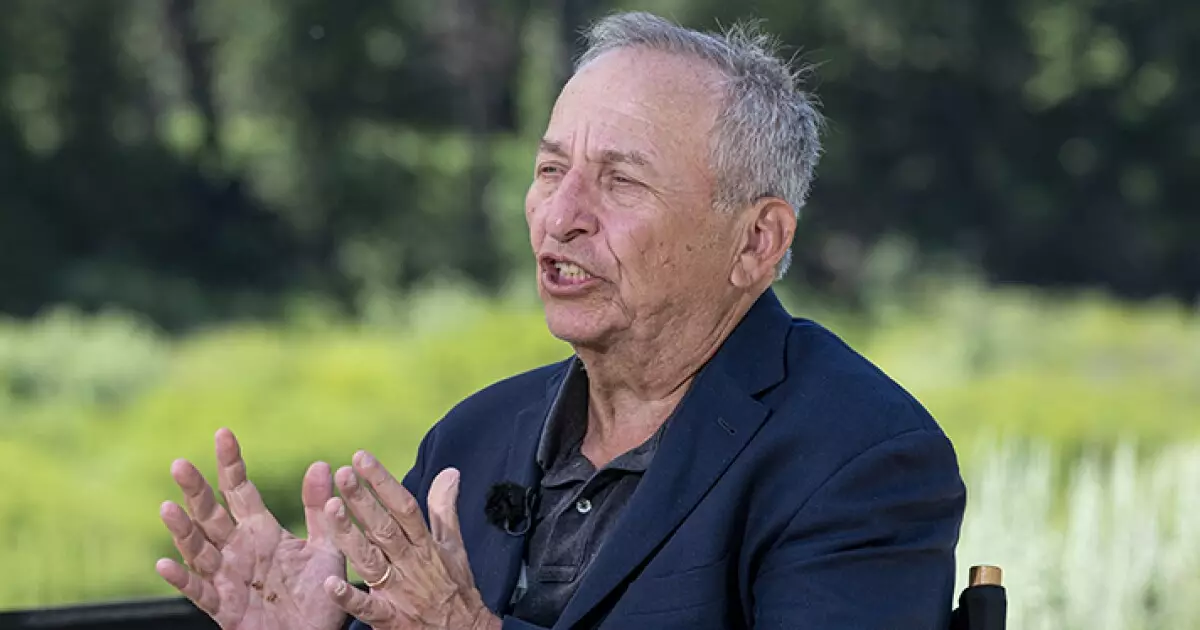As we approach the pivotal moments that will shape the future of the United States economy, the continued speculation surrounding President Trump’s selection of a new chair for the Federal Reserve is increasingly rife with complexity. Despite the controversial nature of Trump’s presidency, many are eagerly anticipating his eventual pick to replace Jerome Powell, with former Treasury Secretary Lawrence Summers suggesting that the president will likely choose a candidate who holds mainstream appeal. However, this assumption may overlook the underlying realities of both Trump’s leadership style and the unique economic climate we face today.
Summers expresses a confidence in Trump’s impending decision, asserting that the president will select a candidate deemed reasonable by both sides of the political spectrum. This perspective seems naïve at best. Trump’s approach has consistently favored those who are loyal to him over the conventional wisdom that guides bipartisan consensus. Rather than seeking a mainstream candidate, it’s plausible that he may prefer someone who aligns with his erratic economic perspective, dismissing established norms in favor of an individual who exhibits unwavering loyalty to his administration and policies.
The Influence of Financial Markets
Summers argues that swift reactions in the financial markets would force Trump’s hand towards a prudent appointment; however, this viewpoint fails to consider the inherent volatility of these markets and their eagerness to overreact. While financial indicators may display short-term reactions to policy changes, long-term economic stability relies on consistency and far-sighted leadership, traits that Trump has frequently eschewed to cater to his whims. Thus, instead of appointing a respected figure, we may see an individual chosen for their alignment with Trump’s desires, which inherently injects uncertainty into an already precarious economic landscape.
As Trump publicly lambastes Powell for not reducing interest rates, it raises questions about whether his criticisms are genuinely rooted in economic analysis or serve as a diversionary tactic. By stirring public discontent, Trump paves the way for a narrative in which any subsequent economic downturn can be blamed on the Federal Reserve’s mismanagement, rather than his administration’s stewardship of the economy. In this context, his fixation on rate cuts seems less about sound economic policy and more about political survival.
The Role of Economic Indicators
The Fed’s recent updates to economic forecasts indicate troubling signs for the U.S. economy, with a simultaneous upward revision of inflation and unemployment—an anomaly in the economic world. Such contradictions suggest that the economy is, in fact, trending towards a supply shock influenced significantly by Trump’s aggressive tariffs and protectionist policies. As energy costs decrease and artificial intelligence harbors potential for productivity gains, these forecasting updates signal a complex battle ahead.
Here, it’s critical to acknowledge that economic decisions should not solely be governed by an individual’s aversion to criticism or fear of repercussion, especially during times when resources are strained. The combination of external pressures and President Trump’s erratic behavior regarding economic management could lead to a weakening of the very institution that stands as a bulwark against recessionary forces.
Policies vs. Politics: A Dangerous Game
Maintaining the independence of the Federal Reserve is not just a matter of protocol; it is crucial for the health of the U.S. economy. If Trump’s policies influence selections within the Fed, we could soon find ourselves navigating a landscape where political agendas and economic realities clash violently. Trump’s insistence on appointing only those who reinforce his narrative does not cultivate a climate of trust but instead fuels discontent among economists and advisors who recognize the criticality of nonpartisan economic stewardship.
In a world where the administration continues to enact policy aimed at stifling criticism and dissent, the implications for the Federal Reserve are multifaceted and profound. If policy decisions are subordinated to the dictates of political maneuvers, the risk of a turbulent economic environment dramatically escalates. The forthcoming appointment may very well set the stage for an unpredictable future, while a genuinely thoughtful choice could provide the steadiness our economy desperately requires.
Though predictions abound regarding Trump’s upcoming decision on the Fed chair, a consensus emerges: the intersection of policy and politics is fraught with peril. It is imperative that we approach these upcoming decisions with vigilance, recognizing the potential ramifications for our national economy.

